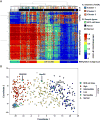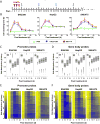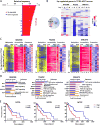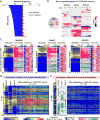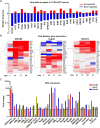Integrative Epigenetic Analysis Reveals Therapeutic Targets to the DNA Methyltransferase Inhibitor Guadecitabine (SGI-110) in Hepatocellular Carcinoma
- PMID: 29774579
- PMCID: PMC6173644
- DOI: 10.1002/hep.30091
Integrative Epigenetic Analysis Reveals Therapeutic Targets to the DNA Methyltransferase Inhibitor Guadecitabine (SGI-110) in Hepatocellular Carcinoma
Abstract
There is an urgent need to develop more effective therapies for hepatocellular carcinoma (HCC) because of its aggressiveness. Guadecitabine (SGI-110) is a second-generation DNA methyltransferase inhibitor (DNMTi), which is currently in clinical trials for HCC and shows greater stability and performance over first-generation DNMTis. In order to identify potential therapeutic targets of SGI-110 for clinical trials, HCC cell lines (SNU398, HepG2, and SNU475) were used to evaluate the effects of transient SGI-110 treatment by an integrative analysis of DNA methylation, nucleosome accessibility, gene expression profiles, and its clinical relevance by comparison to The Cancer Genome Atlas (TCGA) HCC clinical data. Each HCC cell line represents a different DNA methylation subtype of primary HCC tumors based on TCGA data. After SGI-110 treatment, all cell lines were sensitive to SGI-110 with prolonged antiproliferation effects. Expression of up-regulated genes, including tumor suppressors, was positively correlated with nucleosome accessibility and negatively correlated with gene promoter DNA methylation. Alternatively, expression of down-regulated genes, such as oncogenes, was negatively correlated with nucleosome accessibility and positively correlated with gene body DNA methylation. SGI-110 can also act as a dual inhibitor to down-regulate polycomb repressive complex 2 (PRC2) genes by demethylating their gene bodies, resulting in reactivation of PRC2 repressed genes without involvement of DNA methylation. Furthermore, it can up-regulate endogenous retroviruses to reactivate immune pathways. Finally, about 48% of frequently altered genes in primary HCC tumors can be reversed by SGI-110 treatment.
Conclusion: Our integrative analysis has successfully linked the antitumor effects of SGI-110 to detailed epigenetic alterations in HCC cells, identified potential therapeutic targets, and provided a rationale for combination treatments of SGI-110 with immune checkpoint therapies.
© 2018 by the American Association for the Study of Liver Diseases.
Comment in
-
A Three-Pronged Epigenetic Approach to the Treatment of Hepatocellular Carcinoma.Hepatology. 2018 Oct;68(4):1226-1228. doi: 10.1002/hep.30133. Hepatology. 2018. PMID: 30070376 No abstract available.
Similar articles
-
DNMT and EZH2 inhibitors synergize to activate therapeutic targets in hepatocellular carcinoma.Cancer Lett. 2022 Nov 1;548:215899. doi: 10.1016/j.canlet.2022.215899. Epub 2022 Sep 8. Cancer Lett. 2022. PMID: 36087682 Free PMC article.
-
Guadecitabine (SGI-110) priming sensitizes hepatocellular carcinoma cells to oxaliplatin.Mol Oncol. 2015 Nov;9(9):1799-814. doi: 10.1016/j.molonc.2015.06.002. Epub 2015 Jun 16. Mol Oncol. 2015. PMID: 26160429 Free PMC article.
-
Refractory testicular germ cell tumors are highly sensitive to the second generation DNA methylation inhibitor guadecitabine.Oncotarget. 2017 Jan 10;8(2):2949-2959. doi: 10.18632/oncotarget.13811. Oncotarget. 2017. PMID: 27936464 Free PMC article.
-
Hepatocellular carcinoma treatment over sorafenib: epigenetics, microRNAs and microenvironment. Is there a light at the end of the tunnel?Expert Opin Ther Targets. 2015;19(12):1623-35. doi: 10.1517/14728222.2015.1071354. Epub 2015 Jul 27. Expert Opin Ther Targets. 2015. PMID: 26212068 Review.
-
Epigenetic mechanisms regulating the development of hepatocellular carcinoma and their promise for therapeutics.Hepatol Int. 2017 Jan;11(1):45-53. doi: 10.1007/s12072-016-9743-4. Epub 2016 Jun 7. Hepatol Int. 2017. PMID: 27271356 Review.
Cited by
-
DNA methylation subtypes guiding prognostic assessment and linking to responses the DNA methyltransferase inhibitor SGI-110 in urothelial carcinoma.BMC Med. 2022 Jul 18;20(1):222. doi: 10.1186/s12916-022-02426-w. BMC Med. 2022. PMID: 35843958 Free PMC article.
-
Overcoming resistance to immune checkpoint inhibitors in hepatocellular carcinoma: Challenges and opportunities.Front Oncol. 2022 Sep 2;12:958720. doi: 10.3389/fonc.2022.958720. eCollection 2022. Front Oncol. 2022. PMID: 36119533 Free PMC article. Review.
-
Epigenetic remodelling in human hepatocellular carcinoma.J Exp Clin Cancer Res. 2022 Mar 24;41(1):107. doi: 10.1186/s13046-022-02297-2. J Exp Clin Cancer Res. 2022. PMID: 35331312 Free PMC article. Review.
-
Heterogeneous responses in hepatocellular carcinoma: the achilles heel of immune checkpoint inhibitors.Am J Cancer Res. 2020 Apr 1;10(4):1085-1102. eCollection 2020. Am J Cancer Res. 2020. PMID: 32368387 Free PMC article. Review.
-
Characterizing DNA methylation signatures and their potential functional roles in Merkel cell carcinoma.Genome Med. 2021 Aug 16;13(1):130. doi: 10.1186/s13073-021-00946-3. Genome Med. 2021. PMID: 34399838 Free PMC article.
References
-
- Siegel R, Ma J, Zou Z, Jemal A. Cancer statistics, 2014. CA Cancer J Clin. 2014;64:9–29. - PubMed
-
- Shibata T, Aburatani H. Exploration of liver cancer genomes. Nat Rev Gastroenterol Hepatol. 2014;11:340–349. - PubMed
-
- Llovet JM, Burroughs A, Bruix J. Hepatocellular carcinoma. Lancet. 2003;362:1907–1917. - PubMed
-
- Llovet JM, Ricci S, Mazzaferro V, Hilgard P, Gane E, Blanc JF, de Oliveira AC, et al. Sorafenib in advanced hepatocellular carcinoma. N Engl J Med. 2008;359:378–390. - PubMed
Publication types
MeSH terms
Substances
Grants and funding
LinkOut - more resources
Full Text Sources
Other Literature Sources
Medical
Molecular Biology Databases

